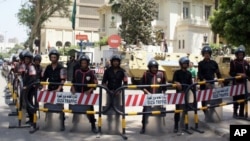Saudi Arabia is reported to be reconsidering the decision to recall its ambassador to Egypt, after leaders in Cairo worked to heal a rift between the Arab neighbors. The Saudis closed their mission in Egypt following anti-Saudi protests there.
Egypt's de-facto leader, Field Marshall Mohamed Hussein Tantawi, reached out to officials in Saudi Arabia in an attempt “to contain the situation.” Egyptian state media said he began efforts to heal the rift within hours of the Saudi decision Saturday to bring its ambassador back home.
Protesters had besieged the embassy in Cairo and other Saudi missions around Egypt for several days last week, protesting the detention of Egyptian human-rights lawyer Ahmed el-Gezawi. His supporters say he is being held in retaliation for a lawsuit he filed against the Saudi monarchy over the treatment of Egyptian workers in the kingdom.
Saudi officials counter that Gezawi was trying to smuggle in vast quantities of a banned anti-anxiety medication.
Mounting tensions
The diplomatic rift is the worst in decades between two of the most influential Arab nations, and caught many average Egyptians by surprise. Student Mohamed Sami believes the Saudis overreacted.
He says rather than recalling their ambassador, the Saudis could have sent a military attache or other officials out to calm the situation. He says closing the embassy was wrong.
Tensions between Cairo and Riyadh have been mounting for more than a year. Saudi Arabia was shaken by the fall of its longtime ally, former president Hosni Mubarak, and is said to have tied much-needed aid to his release from prison. The strain has been compounded by the rise of Egypt's Islamist forces, whose partnership could prove far less reliable.
‘Reactionary decision’
But political analyst and Al Ahram managing editor Amira Howeidi says the embassy closure was a “reactionary decision.”
“I do not think it is a political and strategic decision. It is basically in response to the protests in Egypt and a response message to the Egyptian revolution, but not an issue that could harm or damage Saudi relations, which are very deep.”
Howeidi notes how quickly the Egyptian Cabinet issued a statement expressing regret over the protests.
Many Egyptians say they agree with that statement. Retired doctor, Tari Naguib, appears tired of the near constant rounds of protests that have roiled Egypt since the uprising.
She says these days people go out to chant and protest anything, with the loudest voice dominating. She says she prays calmer forces will soon regain control.
| Join the conversation on our social journalism site - Middle East Voices. Follow our Middle East reports on Twitter and discuss them on our Facebook page. |




